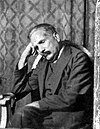Welcome! Check out today's deaths, recent deaths, or our deaths stats.
Feeling experimental? Head on over to our newest (and darkest) feature: Next-2-Die™ predictions
 Abdus Salam
Abdus Salam


Theoretical physicist, and nobel prize in physics recipient.
Born January 29th, 1926 in Jhang.
Died November 21st, 1996 at 70 years old in Oxford (progressive supranuclear palsy).
Sadly, the renowned Pakistani theoretical physicist, Abdus Salam, passed away on November 21, 1996 in Oxford, England at the age of 70. Abdus Salam was born in 1926 in the rural Punjab village of Jhang, British India. He was a brilliant student, resulting in a scholarship to Government College University in Lahore where he earned his MSc in 1946. He went on to St. John's College at the University of Cambridge and graduated in 1949 at the top of his class with a triple first in mathematics, physics, and chemistry. In 1954, Abdus Salam successfully earned his PhD at Cambridge and went on to have a successful international career in physics. Abdus Salam is remembered for his achievement of unifying the theory of weak and electromagnetic interactions to form the electroweak theory, which is now an essential part of the Standard Model of particle physics. For this theory, Salam, along with Steven Weinberg and Sheldon Glashow, won the Nobel Prize in Physics in 1979. His contributions also include rigorous field theories and important work in the physics of gravitation. He was Director-General of the International Center for Theoretical Physics from its establishment until his death. He was also an ardent advocate of Pakistan's nuclear energy program and the establishment of a science and technology university in his home country. Abdus Salam leaves behind an incredible legacy of work and a lasting impact in the physics community.
You might also be interested in...

A. P. J. Abdul Kalam
Born October 15th, 1931 in Rameswaram taluk.
Died July 27th, 2015 at 83 years old




The boundaries which divide Life from Death are at best shadowy and vague. Who shall say where the one ends, and where the other begins? Edgar Allan Poe